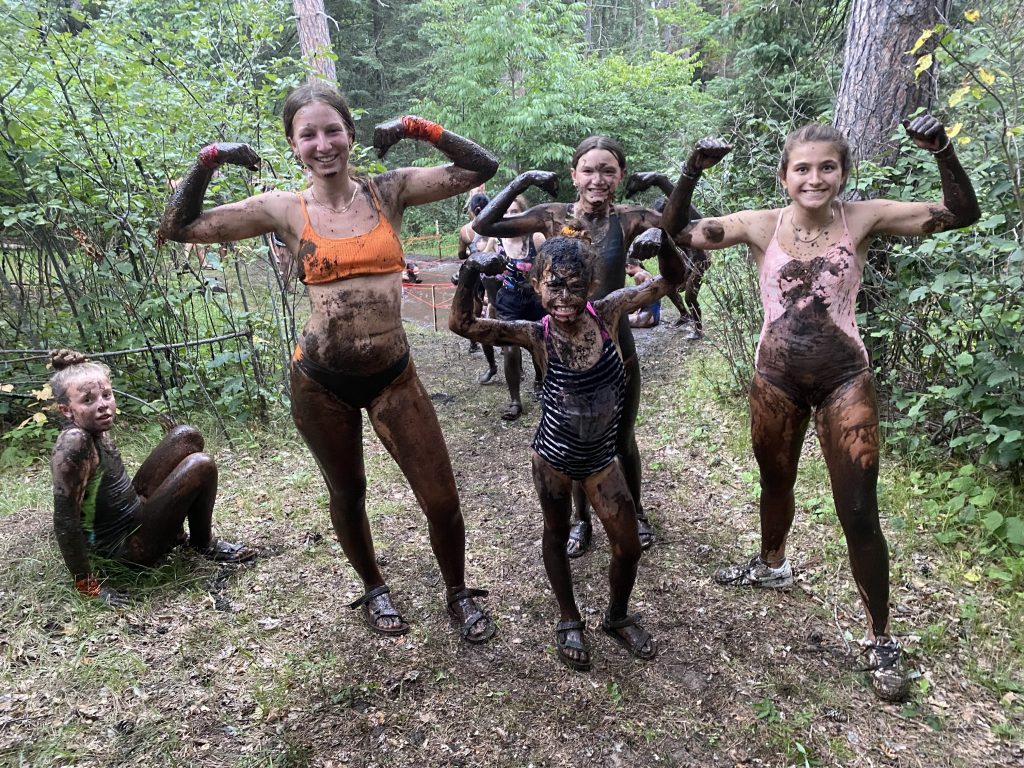
What’s wrong with kids today?
Did you know that summer camp is an American invention – with camps becoming more and more widespread 90 to 100 years ago?? As discussed in a 2002 article written by Notes on Camp, “Back then forward-thinking youth leaders worried about the influence of corrupt city life on the young and mourned the loss of small-town childhood where children could breathe fresh air and explore the woods and lakes. And they questioned what city kids would do during the two-or-three-month summer school vacation that was designed to allow non-city kids to help families harvest crops and herd cows?”
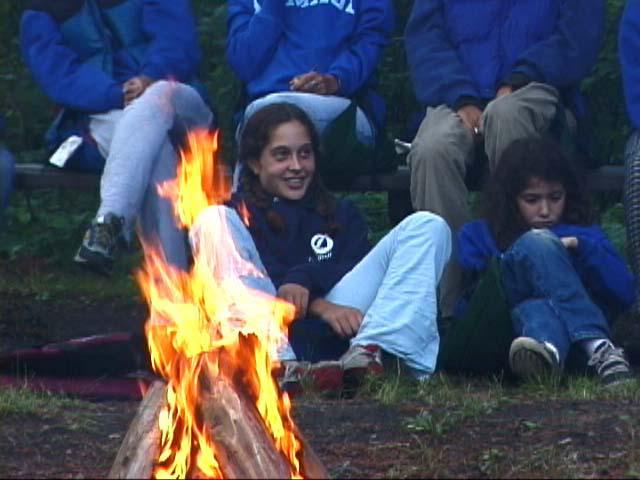
Fast forward 100 years . . . and you’d be forgiven for wondering how this tradition of vigorous summer living can go over in 2009 where kids are wired, plugged-in, connected . . . where playtime has moved indoors and where children are steadily becoming a generation of “muscular thumbs.”
A January 2006 Miami Herald newspaper article reads:
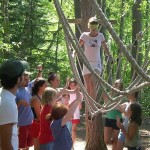
“The street is empty. Even on a balmy winter weekend, exquisite in the way only South Florida days can be at this time of year, the children are nowhere to be seen. There are no bikes, no scooters, no skates, no balls and gloves and pads . . .
“Tree climbing? Who does that anymore? Hide-and- seek? I can’t remember the last time I saw children play what was an all-time favorite game for me when all the cousins got together. Hopscotch, jump rope and stickball — I suppose these have gone the way of eight-tracks and black-and-white TV shows.
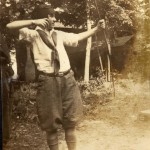
“U.S. factory sales of consumer electronics rose to$125.9 billion. . . and, while this figure includes much more than stuff for children, it remains a good indication of where we’re headed. Hours in front of the screen mean less time in social interaction. Pushing buttons on a control translates into fewer push-ups and exercises.
“Toys reflect the culture, and we are a juiced-up society that can’t unplug itself. We’ve forgotten how to be quiet. We don’t know what it’s like to be bored. We hate to be away from the constant stimulus that promises to keep us connected 24-7.”
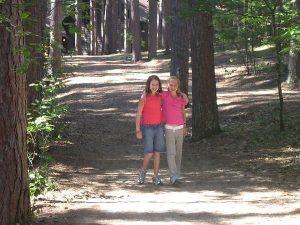
While I find myself caught somewhere between completely buying into what the reporter wrote and vehemently disagreeing, I wonder to myself “Has the person who authored the Miami Herald piece ever been to summer camp?” More specifically, has this person ever been to a Kamaji-like camp?? Where campers have no air-conditioning, no cable TV with 200+ channels, no VCRs, no DVDs, no I-Pods, no arcade games, no computer access, no on-line chats, no instant messaging, no blogs, no cell phones, no e-mails, no DISCMAN, no MTV, no channel surfing, no mini-disc players, no GameBoys, no PCPs. Too, there are no shopping sprees at malls, no meals-made-your-way, no electricity in the cabins, (heck there are no bathrooms in the cabins!!), no exhausted multi-tasked kids, no hefty list of extra-curricular-activities, no-tech experiences, no over-scheduled lives, no cyberspace, no celebrity-and-designer-crazed culture, no fumes, no boys!!
What you will find instead are . . .
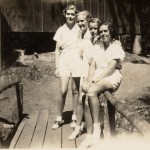 . . . campers canoeing, campers roasting marshmallows, campers tirelessly singing songs, campers playing Capture the Flag, campers captivated by story-telling counselors, campers swimming and sailing in the waters of a crystal clear lake, campers playing tennis and horseback riding, campers surrounded and nourished by the beauty and immensity of nature . . .
. . . campers canoeing, campers roasting marshmallows, campers tirelessly singing songs, campers playing Capture the Flag, campers captivated by story-telling counselors, campers swimming and sailing in the waters of a crystal clear lake, campers playing tennis and horseback riding, campers surrounded and nourished by the beauty and immensity of nature . . .
. . . and steamy bowls of oatmeal, stars glittering above the lake, camp-like pleasures including brain-teasers and head-to-head intimate conversations, morning flag, bunk beds, chipmunks, campfires, insect bites, shared experiences and shared memories, a climbing wall, great friends, cabin inspections . . .
. . . campers connecting with people in a way they never have before, where there is a calmness to life, a lack of urgency and worry, where if the day’s tennis instruction or swimming lesson does not get done the sun will still rise in the morning and no one will be any less for it, where everyone knows your name . . .
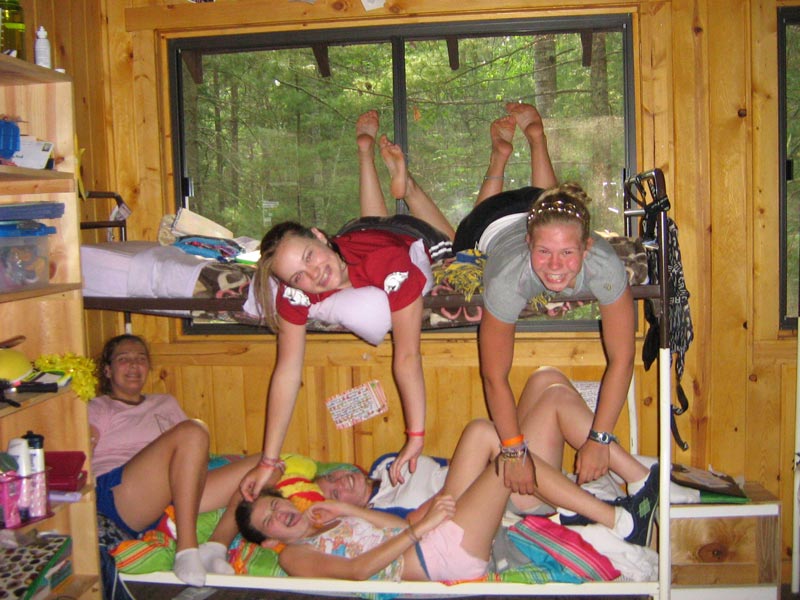
Cabins are not just for sleeping! They’re for building friendships at Camp Kamaji
. . . where Native American words – Ishkaday, Waubun, Mundahmin, Metig, Geshig, Nanahtahga – have special meaning, where daily rituals are steeped in decades of nostalgic tradition, where mistakes are ok and perfection is rare . . .
. . . where it is ok to make friends and share friends, where a camper can discover herself, where responsibility, independence, mutual respect, friendship, leadership and cheerfulness are reinforced . . .
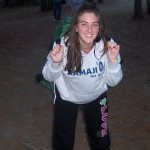 . . . where an atmosphere of trust that nurtures fond memories and deep, often lifelong, friendships and a lifetime of experiences await all, where campers feel as if they’re in a place that doesn’t change . . . where time and technology don’t reach . . .
. . . where an atmosphere of trust that nurtures fond memories and deep, often lifelong, friendships and a lifetime of experiences await all, where campers feel as if they’re in a place that doesn’t change . . . where time and technology don’t reach . . .
. . .and where that’s all okay!!
Is it a surprise, then, that it is still possible to take kids who are gadget-mesmerized, techno-driven and plugged-in. . . and entice them with the magic of camp? It shouldn’t be. Kids can be as fine as a culture asks them to be.
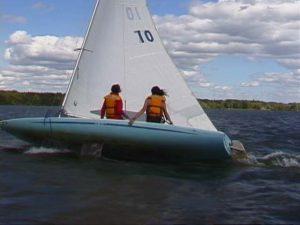

great article. it’s been 20 years since i first went to camp (and 11 years since I last went to camp), and i still reflect on the days i spent there, the people i met, the things i did and the the simplicity of life while i was there. i wish every little girl could go to kamaji.
Enjoyed reading the article which does point out what a great learning experience it is for the girls at camp to be outdoors and having such a good time without headsets, computer games, texting and any other electronics that occupy their time.
Excuse me while I read some more of the blog